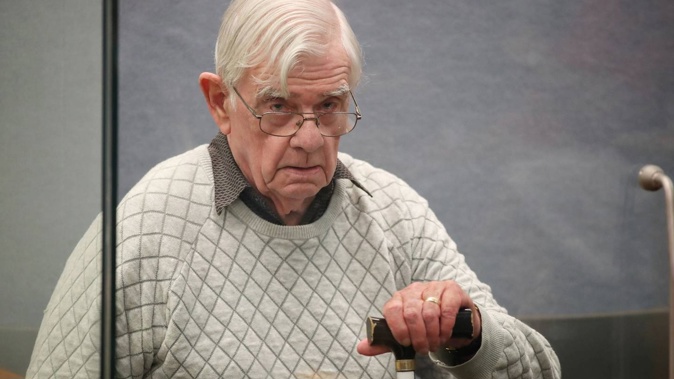

Warning: This story discusses sexual abuse.
A former teacher at Dilworth School, convicted of sexual abuse of multiple young boys, will spend less time behind bars after a court ruled he should have been given a greater discount for reparation he paid his victims.
Robert Howard Gladwin Wynyard, 74, was in February sentenced to six years and three months behind bars for the historical abuse which spanned 20 years against eight victims.
Two weeks before his scheduled trial, he pleaded guilty to nine charges of indecency between a man and a boy and two charges of indecent assault on a person under 12.
The children were between the ages of 8 and 15 when they were groomed.
Soon after sentencing, he appealed his sentence to the Court of Appeal, claiming his ongoing stint behind bars was “manifestly excessive”.
The appeal alleged sentencing judge Justice Simon Moore failed to make proper allowances for Wynyard’s remorse, reparation paid to victims and his own experiences of sexual abuse as a child. The appeal was opposed by the Crown.
In a decision released this morning, the Court of Appeal allowed part of the appeal, reducing Wynyard’s prison sentence by five months.
At the High Court sentencing, Justice Moore granted a 30 per cent total sentence discount from a sentence starting point of nine years’ imprisonment, including 20 per cent for his guilty pleas.
- Dilworth teacher, 74, who admitted abusing students can now be named
- 'Dirty paedo': Multiple men confront former Dilworth teacher as he's sentenced to prison for 'prolific' abuse
A further 10 per cent discount was added for remorse and the $10,000 he paid in reparations to each victim. He earlier sold his home to fund the reparation payments.
While the judge acknowledged that Wynyard was sexually abused himself as a child, he did not grant a further discount.
/cloudfront-ap-southeast-2.images.arcpublishing.com/nzme/PBR7MEBOZ2F7M3KQKLYROYKXI4.jpg) Dilworth School in Remuera, Auckland. Photo / Dean Purcell
Dilworth School in Remuera, Auckland. Photo / Dean Purcell
Wynyard’s lawyer Justin Harder said the sentence starting point should have been seven years, based on sentences in previous cases and the sentencing practices at the time of the offending in the 1980s.
While agreeing with the 20 per cent discount for guilty pleas, Harder believed Wynyard should have received 10 per cent respectively for remorse, reparation and personal circumstances, bringing the total discount to 50 per cent.
The sentence should be no greater than three to four years imprisonment, he said.
For the Crown, Jacob Barry said the sentence was in range and no error was made by the judge.
The Court of Appeal ruled that, “while stern”, the sentencing starting point adopted by Justice Moore on the most serious charges was well within the available range. The overall starting point of nine years was also appropriate, it found.
When it came to the discount for reparation, the court said payments made must be a mitigating factor in sentencing, but there is “no fixed tariff”.
It was noted the victims were sceptical about Wynyard’s motives with the payment. “A recurring theme was that the victims did not believe that the payment expiated or mitigated Mr Wynyard’s wrongs,” the Court of Appeal decision said.
“Nevertheless, in our judgement the 10 per cent allowed by the judge for remorse and for the payment of reparation was insufficient. There was clear remorse expressed by Mr Wynyard.”
The court uplifted the discount to 15 per cent. It could have been 20 per cent, the court said, but it found Justice Moore was already generous in his 20 per cent discount for guilty pleas that came just two weeks before trial.
When it came to the claim for a discount of 10 per cent for his experience of abuse as a child, the court ruled that the severity of the offending against boys who trusted him did not allow a discount.
“Mr Wynyard cynically and callously abused that trust. The scale and extent of his offending is such that a discount for his personal background is not available to him.”
Overall, the court only amended the discount related to reparation and remorse, from 10 per cent to 15 per cent.
The sentence of six years and three months imprisonment was quashed and replaced with a sentence of five years and 10 months.
Ethan Griffiths covers crime and justice stories nationwide for Open Justice. He joined NZME in 2020, previously working as a regional reporter in Whanganui and South Taranaki.
MALE SEXUAL ABUSE SURVIVORS
Where to get help: If it's an emergency and you feel that you or someone else is at risk, call 111.
• If you've ever experienced sexual assault or abuse and need to talk to someone call the confidential crisis helpline Safe to Talk on 0800 044 334 or text 4334. (available 24/7)
• Male Survivors Aotearoa offers a range of confidential support at centres across New Zealand - find your closest one here.
• Mosaic - Tiaki Tangata: 0800 94 22 94 (available 11am-8pm)
• Alternatively contact your local police station - click here for a list. If you have been abused, remember it's not your fault.
Take your Radio, Podcasts and Music with you








